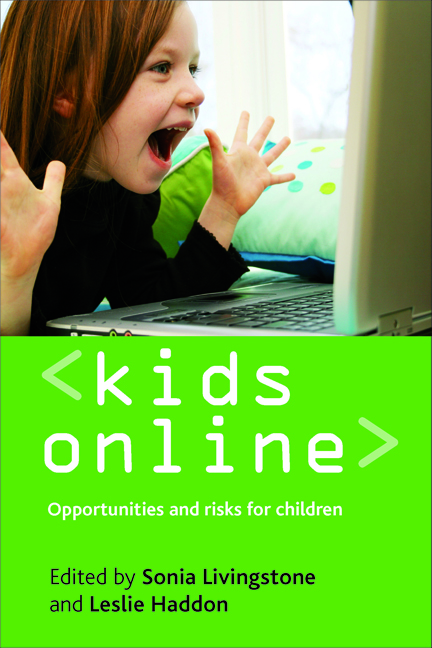Book contents
- Frontmatter
- Contents
- Notes on contributors
- Acknowledgements
- one Introduction
- Section I Researching European children online
- Section II Going online: new opportunities?
- Section III Going online: new risks?
- Section IV Policy implications
- Appendix A List of country codes
- Appendix B Children and parents online, by country
- Appendix C The EU Kids Online network
fourteen - The role of parental mediation in explaining cross-national experiences of risk
Published online by Cambridge University Press: 15 July 2022
- Frontmatter
- Contents
- Notes on contributors
- Acknowledgements
- one Introduction
- Section I Researching European children online
- Section II Going online: new opportunities?
- Section III Going online: new risks?
- Section IV Policy implications
- Appendix A List of country codes
- Appendix B Children and parents online, by country
- Appendix C The EU Kids Online network
Summary
Introduction
The range and incidence of risks experienced by children online varies cross-nationally, although the overall rank ordering of more or less common risks is fairly consistent (Hasebrink et al, 2009). The reasons why countries vary in online risk experience and risk perception have recently attracted concern from different academic disciplines, such as media studies and consumer research (Livingstone and Bovill, 2001; Park and Jun, 2003; Mediappro, 2006; SAFT, 2006; Livingstone and Haddon, 2008). Some authors state that challenges lay in the form of having a different primary target and a different working style in each country (for example SAFT, 2006: 3). Yet the question of how exactly cross-national differences in the degree of children's online risk experiences can be explained has rarely been examined from an international, comparative perspective. This chapter examines in detail the factors that help explain the differing likelihood of online risk experiences in different European countries. More specifically, it addresses the question of whether parental mediation, when other factors are controlled for, plays a significant role in reducing risk across 18 European countries.
The EU Kids Online network has identified cross-national diversity in the occurrence of risk experiences across Europe, and has been able to distinguish between high, medium and low-risk countries (Hasebrink et al, 2009; see also Chapters Four, Six and Fifteen, this volume). Our own work (Bauwens et al, 2009: in press) looked at the factors that shape online risk experience for children in high-risk countries by examining the combined impact of seven factors related to the spheres of government, industry, education and children. These seven factors included children's use of the internet, the national legal framework, the country's Networked Readiness Index (NRI, 2008), educational policy, the role of internet service providers (ISPs), public sector and non-profit online content provision and awareness raising.
We found that risks experienced in 18 different countries showed very different patterns, each country possessing its own specific configuration of factors (which during the process of analysis we call ‘conditions’). We also concluded that expected traditional social, cultural, political and economic divides between old and new European Union (EU) member states do not coincide with the gap between high and non-high (that is, medium and low) risk countries.
- Type
- Chapter
- Information
- Kids OnlineOpportunities and Risks for Children, pp. 173 - 184Publisher: Bristol University PressPrint publication year: 2009



